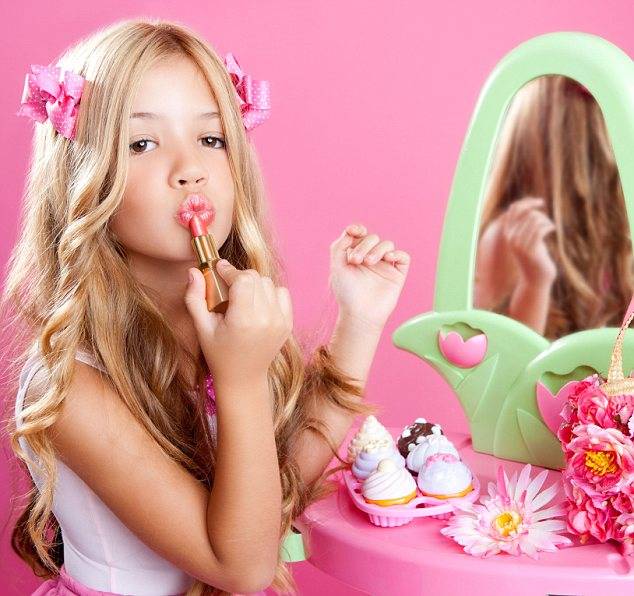A salon for little girls seems to have opened recently in Lahore. As the parent of a handful of them, this is disturbing to me. Social notions of what beauty should be, and what prettiness looks like, is already so pervasive all over the world that opening a beauty salon exclusively for the improvement of little girls seems a particularly unwise business venture. And yet one is certain the salon will do well, because little girls invariably tend to want to paint their nails and do things with their hair that involves intricate braiding and glitter and plastic flowers, and when there is a service that provides it, sooner or later some mother is going to be ferrying her daughter to it.
Children like to ape grown-ups, and when the grown-ups in their lives do spend time on their appearance they mimic that behaviour. This is normal, and all children do it, but I do find that our distinction between what is child-appropriate and what is not is becoming blurry. We’re admittedly less strict than our parents were, and many of us don’t think it’s a big deal to let your six year old put turquoise eye shadow on over the weekend. It usually isn’t, because to them it’s playacting, and nobody takes turquoise eye shadow seriously. Neither is it so horrifying to let your kids—girls and boys, I hasten to add—wear your shoes and necklaces and play dress-up. It’s fun and imaginative and doesn’t involve putting the television on. But a salon? A real life proper salon with beauticians and haircut chairs and mani-pedi stations for “little princesses”? Isn’t that taking play-acting a bit too far?
Society polices appearance, and women’s appearances are under constant scrutiny. One is never thin enough or fair enough. If you are, then your hair needs to be straight, black and silky. If your hair is fine then your skin needs zinc supplements for it to glow. If that’s ok, your feet are too big or your nose is too long or your eyebrows are wild jungles. We’re all trapped by grooming, this constant pressure to conform and look a certain way, for only that particular look is an acceptable standard of beauty. So one must be hairless, frizz-free and have had one’s feet bleached all the time. Everyone knows this is next to impossible, and yet, because some people are able to achieve this look (through constant vigilance, no doubt), it is expected of all of us. Men can be scruffy and stubbly and be wearing whatever they pulled out of the cupboard with their eyes half-closed and nobody will bat an eyelid; you’ll never catch a woman stepping out of the house sporting mismatched socks or a bit of upper-lip fuzz if she can possibly help it.
Two of my daughters have curly hair, like most of their family. People frequently commiserate with me about this. Your poor daughters, they say. They’ll be cursing you when they grow up for giving them curly hair. Inshallah they will be sensible and happy and self-confident, I reply, and will delight in having curly hair, because they are perfect just the way they are. I will never, ever tell them that their arms are too hairy, that they are just a bit chubby or that their hair is better off straight like everyone else’s because I try to embody the self-confidence that I want them to have. I wear my own curly hair with pleasure and a bit of panache, and I never let them hear me grousing about how much I weigh. I know that I have to protect them from the masses of people that surround them—on television, in magazines, in school—that will invariably start making them feel like they aren’t good enough as they are. I want them to take pride in their selves and to respect and look after their bodies, and they will be looking to me first as an example of how to do that.
If only we spent more time playing sports with our girls, teaching them to dance and run and learn to connect with their bodies and accept them instead of ending up being critical. That’s what a salon for little girls seems to be doing. It sends a strange and confused message to mothers and daughters alike. Are ten year olds supposed to have tidy cuticles and filed nails? Is the average four year old supposed to have her bangs cut professionally? Why is any of this important at this age? Aren’t little girls supposed to be, like their male counterparts, climbing trees and riding bicycles and digging pits and playing imaginary games with their pals? They have their entire adult lives ahead of them to have spa days and blow-dries and facials and Essie manicures, and all their teenage years to fret about their skin and their hair. I suppose it would be idealistic to say that I wish we never put our young women through that stress at all, that our daughters could blithely go through life seeing themselves the way we do—clever, charming, beautiful in every way. They won’t, or it will take them many years to accept themselves the way they did when they were very small. In an age of Kim Kardashian’s contoured, flawless face (and other parts), Photoshop and Instagram filters, our girls are very small cogs in a very large and dangerous self-image machine. But however small, each child needs their parent to be their shield against the world. We are the guardians of their childhood, and I for one insist that my little girls will stay that way for as long as I can help it.
The writer is a feminist based in Lahore.
m.malikhussain@gmail.com






